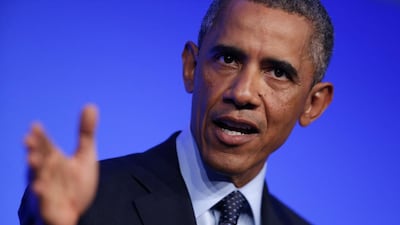NEW YORK // Barack Obama on Wednesday will outline his plans for expanding a US-led military campaign against ISIL extremists that US officials have said could take years to complete.
The campaign could include US airstrikes against the group in northern Syria and a long-discussed US military effort to build up beleaguered rebel groups to fight ISIL, US officials were reported as saying.
Mr Obama will meet Congressional leaders on Tuesday to preview his administration’s efforts to add to an international coalition of US allies in Europe and the region to fight ISIL, and is expected to urge the legislators to quickly approve $500 million (Dh1.84 billion) for training and arming vetted Syrian rebel groups.
The US secretary of state John Kerry, meanwhile, was to set off on Tuesday on a trip to Jordan and Saudi Arabia as part of efforts to build an international coalition to counter ISIL, the state department announced on Monday night. A spokesman said that more than 40 countries have already indicated a willingness to help out in some way against the militants.
Mr Obama told NBC's Meet the Press on Sunday that in Syria, "the boots on the ground have to be Syrian … we're going to have to develop a moderate Sunni opposition that can control territory and that we can work with".
The question of defeating ISIL in Syria is expected to be the most fraught – and crucial – aspect of Mr Obama’s strategy, as regional allies remain wary of his commitment to rebels there.
The first step in the plans, Mr Obama said, is already under way. US airstrikes and military advisers are helping forces in Iraq begin to push back ISIL’s gains in strategic areas, and protect minorities and US diplomatic facilities.
This phase was expanded on Monday when US airstrikes targeted ISIL positions in Anbar province for the first time, around Haditha dam. The Iraqi government requested the assistance as its security forces and Sunni tribal militias fought to secure the country’s second-largest hydroelectric dam.
“The next phase is now to start going on some offence,” Mr Obama said.
Stepped-up US efforts to train and equip Iraqi forces, Kurdish peshmerga fighters and Sunni militias would be a part of this offensive, but such measures would only begin after a more inclusive Iraqi government is formed in Baghdad. Mr Obama said he was “optimistic” that the government will be formed this week.
The Iraqi parliament was debating the new government on Monday night.
The US secretary of defence, Chuck Hagel, travelled to Ankara on Monday to get Turkey on board with the White House plan, and the secretary of state, John Kerry, is expected to visit Middle East capitals soon to try to expand the 10-country coalition against ISIL.
Exactly which countries will be involved and how they will contribute is still unclear, but US officials have said that it is crucial that Sunni-led countries play a part, both for legitimacy and because they have the most at stake, and also because only they can help facilitate the more complex political reconciliation process necessary to convince Sunnis in Iraq and Syria to fight ISIL.
“[W]e’re going to need Sunni states to step up – not just Saudi Arabia, our partners like Jordan, United Arab Emirates, Turkey,” Mr Obama said. “Perhaps the first time, we have absolute clarity that the problem for Sunni states in the region, many of whom are our allies, is not simply Iran. It’s not simply a Sunni-Shia issue. Sunni extremism, as represented by ISIL, is the biggest danger that they face right now.”
US officials have said that Jordan would be best placed to help provide on-the-ground intelligence on ISIL, and that Saudi Arabia will be able to use leverage with Sunni tribes and to help fund Syrian rebels.
The difficulty of convincing Sunnis to take on ISIL — without the US military backing for Iraqi Sunni fighters that helped them defeat ISIL’s predecessor in 2008 — was highlighted on Monday by a suicide car bombing of a meeting between Jabour tribal fighters and Iraqi forces in the town of Duluiyah, 80 km north of Baghdad.
At least 16 were killed and 55 injured in the town that was cleared of ISIL militants by the Jabour tribesmen in July.
The Arab League early on Monday issued a resolution calling for immediate measures to fight ISIL on political, military, legal and security levels, but did not give further details. The lack of details is a sign that US efforts to get firm commitments in writing may be more difficult than expected.
The league’s resolution underscored apprehension about the US approach to ISIL, and whether it would be selective and focus on Iraq while not addressing the underlying causes of the group’s rise in Syria, Mustafa Alani, director of the security and defense department at the Gulf Research Center in Geneva, told the Associated Press.
“There will be no signing on a white paper,” Mr Alani said. Arab leaders want “equal efforts in changing the situation in Syria. Without it, it is a lost war.”
tkhan@thenational.ae

